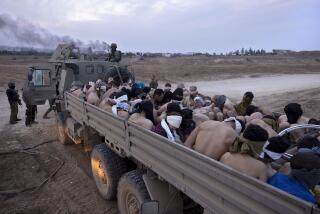Nurse Eases Misery of Rwandan Refugees
Ellen Neiman was at a point in her life when other women might consider retirement, golf and baby-sitting. She is devoted to her six grandchildren, but she’s also driven by an inner curiosity and a need for definition--about herself and for her world. So, she started with her own heritage.
Neiman, a nurse, had no idea that when she began exploring her faith, Judaism, she would also be guided by the philosophy of tikkun olam --healing the world.
It led her to Ethiopia in 1992, where she ran a crafts project with the North American Conference on Ethiopian Jewry. She wanted to become more familiar with Ethiopian Jews.
“There’s no ‘us’ and ‘them’ anymore--it’s all us,” Neiman, 61, said from her home in Mar Vista.
Although there was no opportunity to do any medical work in Ethiopia, the experience eventually led her to one of the hottest of the world’s hot spots--the Rwandan refugee camps in Zaire. During her trip to Ethiopia, she met Richard Hodes, a member of the American Jewish Joint Distribution Committee, a worldwide rescue and relief agency. As a result, she was invited earlier this year to join a five-person team headed by Hodes to provide medical aid to the Rwandan refugees.
“I had been having this incredible urge to go as soon as the news carried the story about the civil war in Rwanda, and then the Los Angeles Times ran a story on Aug. 10 that put me over the edge. I saw these pictures of the children, and two weeks later I was on a plane bound for Goma, Zaire,” she said.
Neiman spent a month in Zaire. She is back home now, with a stack of photographs of the Hutu people she nursed and a detailed journal of her time there.
When she arrived at a refugee camp, firefighters from San Francisco had cleaned up the water system, so she didn’t see people stricken by cholera. But she did arrive in time for an epidemic of shigellosis, a devastating bacterial illness that causes bloody diarrhea.
“My first sight of the camp (was) the hundreds and hundreds of huts barely high enough for a person to stand up in,” Neiman said. “The lucky ones had (a hut) covered in plastic. I was shocked to see so many people walking and so many dead bodies left alongside the roads. So many beautiful children, so lost, so sick. I cried a lot. But I never thought of coming home.
“The first time I cried was on the second night when I was told about the volcano. The government of Zaire had designated the land below an active volcano for the refugees. It could not be farmed, and at any moment (the volcano) could erupt. We either had six to 12 hours to move everyone out or no time. That’s how tenuous it was. I did ask myself, ‘What am I doing here?’ There were 180,000 Hutus in our camp, Kibumba. The medical and sanitary team stayed in a house in Goma because it was not safe for us around the camp at night.”
Neiman says she pushed away the danger and fear because she felt protected by one essential fact. “I was doing good work.”
And, of course, there were the children.
“At first, when they looked at my face, they burst into tears. They were afraid of us. It didn’t make me feel terrible. I felt wonderful the first time they said ‘thank you’ or smiled at me, and especially when they got better.”
On the third day, the medical team pitched a tent and opened a makeshift clinic. Neiman treated victims of skin diseases, lice, infections, pneumonia, mumps, malaria and worms. The last 10 days were devoted to teaching the refugees to take over their own health care. “When I left, it was really the beginning for them,” Neiman said.
Emboldened by her experience in Zaire, Neiman, who for the past year has been a part-time lecturer at the USC Department of Nursing, is now looking for a job in family practice medicine and wants to keep talking about the experience with groups who are interested. She is also continuing her work as a board member with Clinica Para Las Americas, an organization that provides health care to underserved communities in central Los Angeles. She hopes her experience there will help her in the event of any future emergencies abroad.
“If I’m going to do any refugee work, I want to be able to speak directly to the people and not through a translator. So if there is another worldwide emergency, in the Spanish-speaking world, I would go,” she said.
In the meantime, she will practice tikkun olam at home. “This is what we are supposed to be doing as a people,” she said.
More to Read
Sign up for Essential California
The most important California stories and recommendations in your inbox every morning.
You may occasionally receive promotional content from the Los Angeles Times.










